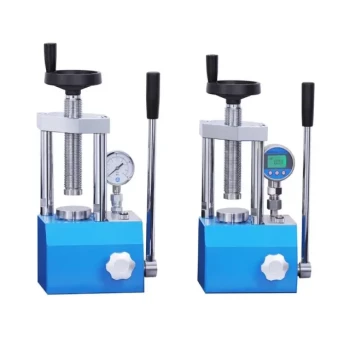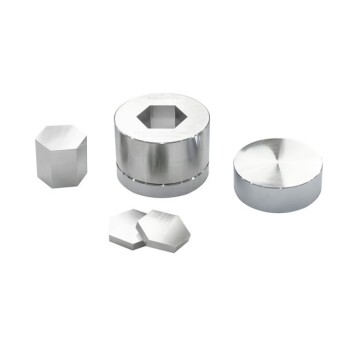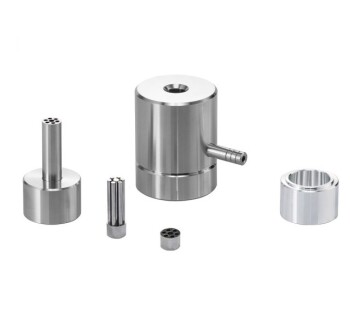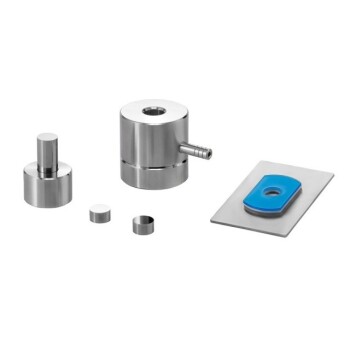In essence, an ideal hydraulic fluid is one that transmits power efficiently, lubricates moving parts, and remains stable across a wide range of operating conditions. The primary characteristics that enable this are a carefully balanced viscosity, near-incompressibility, high thermal stability, and compatibility with the system's materials.
The concept of an "ideal" hydraulic fluid is a balance, not a set of absolute maximums. The goal is to select a fluid whose properties are optimized for a specific system's operating temperature, pressure, and mechanical demands to ensure maximum efficiency and longevity.

The Four Pillars of a High-Performance Hydraulic Fluid
A hydraulic fluid has two primary jobs: transmitting power and protecting the system. These four properties are critical to performing both functions effectively.
Viscosity: The Fine Line Between Flow and Protection
Viscosity is a fluid's resistance to flow and shear. It is arguably the most important property, as it directly impacts both system efficiency and component wear.
Unlike the simple idea that "higher is better," the ideal viscosity is a precise balance.
- If viscosity is too high: The fluid is too thick. This leads to sluggish operation, increased friction, higher energy consumption, and poor heat dissipation.
- If viscosity is too low: The fluid is too thin. This results in poor lubrication, increased wear on pumps and valves, and potential for internal leaks that reduce system efficiency.
Incompressibility: The Foundation of Power Transmission
The core principle of a hydraulic system is that force applied to an enclosed fluid is transmitted equally in all directions. This only works if the fluid itself does not compress significantly under pressure.
An ideal fluid has low compressibility, ensuring that when a pump applies pressure, that energy is immediately converted into mechanical work, not wasted on squeezing the fluid. This results in a rigid, responsive, and efficient system.
Thermal Stability: Performing Under Pressure and Heat
Hydraulic systems generate heat. As a fluid's temperature changes, so does its viscosity. Thermal stability is the fluid's ability to maintain its key properties, especially viscosity, across a wide temperature range.
The key metric here is the Viscosity Index (VI). A fluid with a high VI will experience very little change in viscosity as it heats up or cools down, ensuring consistent system performance from a cold start to full operating load.
Chemical Stability & Material Compatibility
A hydraulic fluid is constantly in contact with seals, hoses, and metal components. It must be chemically inert and non-corrosive to protect the integrity of the system.
- Material Compatibility: The fluid must not cause seals and hoses to swell, shrink, or degrade, which would lead to leaks and system failure.
- Chemical Stability: The fluid must resist oxidation (reaction with oxygen, which creates sludge and varnish) and hydrolysis (reaction with water, which forms corrosive acids). This stability directly determines the fluid's useful service life.
Understanding the Trade-offs: No Single "Perfect" Fluid
Selecting a fluid involves balancing competing properties. Understanding these trade-offs is key to making an informed decision for your specific application.
Viscosity vs. Efficiency
A higher viscosity fluid provides a thicker, more robust lubricating film that is excellent for protecting high-load components. However, this thickness requires more energy to pump, reducing overall system efficiency. A lower viscosity fluid flows more easily but may not provide adequate protection under extreme pressure.
Additives vs. Fluid Life
Most modern fluids contain an additive package to enhance properties like wear resistance, corrosion inhibition, and Viscosity Index. While these additives are essential, they can be depleted over time. A fluid with a high-endurance additive package will cost more but will maintain its performance for longer.
Cost vs. Performance
Mineral-based hydraulic fluids are cost-effective and suitable for many standard applications. However, synthetic fluids offer vastly superior thermal stability (high VI) and chemical resistance, making them a better choice for systems operating in extreme temperatures or requiring very long service intervals, despite their higher initial cost.
Selecting the Right Fluid for Your Application
Your choice should be guided by the demands of your hydraulic system.
- If your primary focus is heavy loads and component protection: Prioritize a fluid with a robust anti-wear additive package and a viscosity grade recommended by the pump manufacturer for high-pressure operation.
- If your primary focus is precision and high-speed operation: Select a fluid with a lower viscosity for better responsiveness and heat dissipation, ensuring it still meets the minimum requirements for lubrication.
- If your primary focus is operation in wide temperature swings: A fluid with a very high Viscosity Index (VI), typically a synthetic or multi-grade oil, is non-negotiable.
- If your primary focus is long-term reliability and minimal maintenance: Invest in a synthetic fluid with excellent chemical stability to resist oxidation and sludge formation, extending service intervals.
Choosing the right fluid is a technical decision that directly impacts the performance, reliability, and lifespan of your equipment.
Summary Table:
| Characteristic | Key Role | Ideal Property |
|---|---|---|
| Viscosity | Balances flow and lubrication | Precise balance for specific system demands |
| Incompressibility | Ensures efficient power transmission | Low compressibility for responsiveness |
| Thermal Stability | Maintains properties across temperatures | High Viscosity Index (VI) for consistency |
| Chemical Stability & Compatibility | Protects system components | Resists oxidation, hydrolysis, and material degradation |
Upgrade your hydraulic system with the right fluid for peak efficiency and durability! KINTEK specializes in lab press machines (including automatic lab press, isostatic press, and heated lab press), serving laboratories that rely on precise hydraulic performance. Our expertise ensures you get tailored solutions to enhance your equipment's lifespan and reliability. Contact us today to discuss your needs and discover how we can support your lab's success!
Visual Guide

Related Products
- Manual Heated Hydraulic Lab Press with Integrated Hot Plates Hydraulic Press Machine
- Heated Hydraulic Press Machine with Heated Plates for Vacuum Box Laboratory Hot Press
- Automatic Heated Hydraulic Press Machine with Heated Plates for Laboratory
- Manual Laboratory Hydraulic Press Lab Pellet Press
- Automatic Laboratory Hydraulic Press Lab Pellet Press Machine
People Also Ask
- How is a heated hydraulic press used in material testing and research? Unlock Precision in Material Analysis
- What makes laboratory presses durable and consistent? Key Design and Control Insights
- How does a hydraulic press assist in forming materials? Unlock Precision and Power for Your Lab Needs
- What are the key technical requirements for a hot press machine? Mastering Pressure and Thermal Precision
- What is the core function of a heated hydraulic press? Achieve High-Density Solid-State Batteries



















